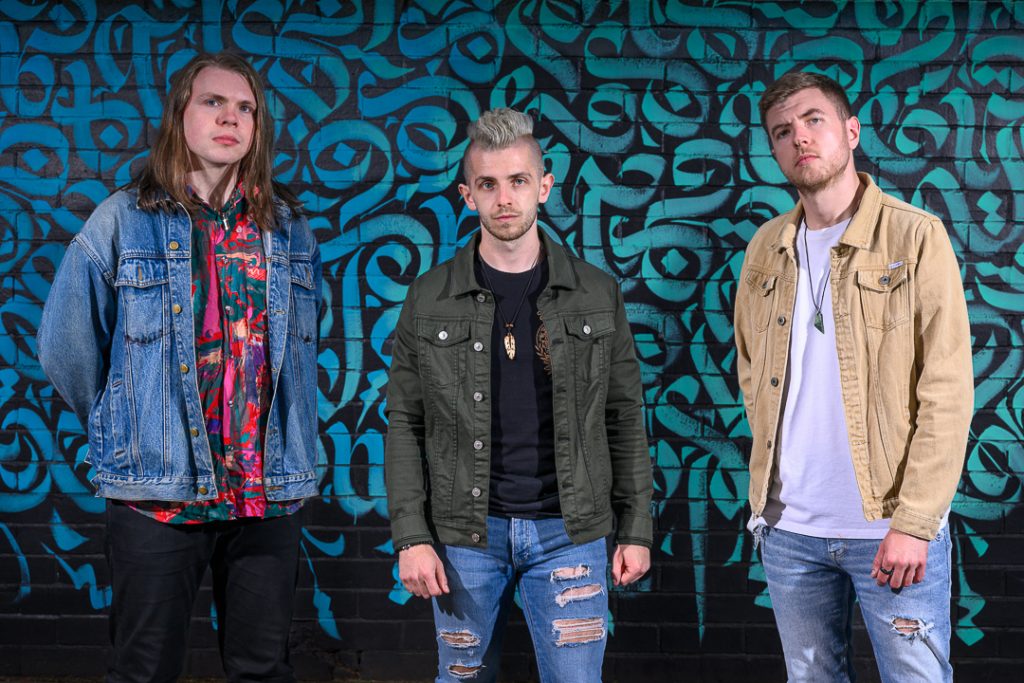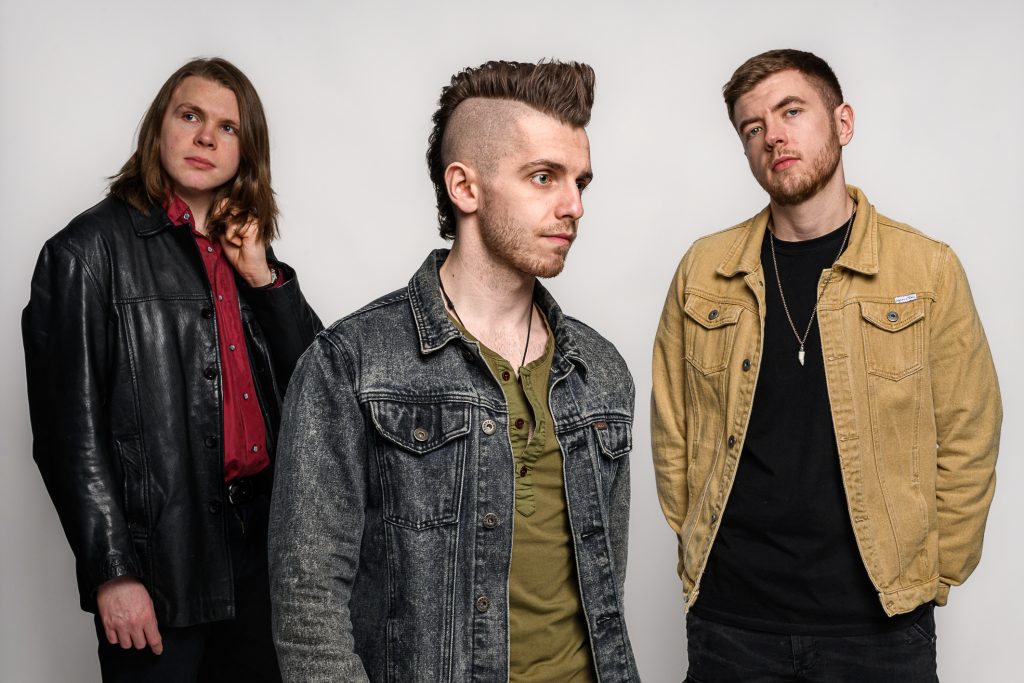Words by Emily Williams
It’s a quiet Friday afternoon as I log onto Zoom to speak to Anchor Lane, who have just begun their
UK headline tour starting in Bradford. It is their first time touring an album after the scheduled tour
for their debut album Casino was stopped due to the COVID-19 pandemic. We chatted about influences, image, and intentions for their new album Call This a Reality?.
Did you make the album through the pandemic?
Conor: We kind of wrote it through that time but it was recorded after then.
Lawrence: If you listen to the lyrics and album, it’s quite spiteful at times. It’s definitely inspired by how you feel when you feel like just everything’s pretty bleak as a society. But then, as you know, after that gigs were coming back, and life was back to normal.
Were there any other inspirations for the concept of Call This a Reality? and the songwriting on the
album?
Graeme: The whole thing is a reflection on our lives and our collective experiences; it’s
kinda like a musical autobiography, in a way. It’s a summary of all your musical experiences and non-
musical experiences and opinions and anger and joy and sadness and all of that is put into how we
as a band choose to express ourselves through music. So, it’s a combination of a bunch of
different things: like the way the government treats us as second, third, fourth and
fifth-class citizens, as well as hard personal heartbreak and stuff like that. A bunch of different
things influenced the album collectively.

Do you write before the instruments? What is a typical process in creating a song for you all?
Lawrence: I feel like we could write 10 albums and it would still be quite hard to explain exactly how they come together. I think you just push through ideas until you find something you like. But for us, it was about having the impact of rock music and also having music that served enough room for what matters, and what is the main message – which is the vocal and the melody that the vocal provides. It’s better to have relatively minimal
ideas and a lot of impact that you could create a story on top of it, rather than coming at it from a strict and instrumental point of view which can be a wee bit busy.
Do you ever consider live elements when creating a song?
Conor: This album is the least we ever thought about that in terms of how our crowd will react to this because the whole point of it was to write music that we felt was accessible but accessible from a different kind of standpoint. It wasn’t really about how people were going to respond to this live, it was questioning if people were going
to catch on to it or if they’d want to get involved with it, but it wasn’t necessarily from a live
sense.
Graeme: I think that comes in the immediate aftermath of either writing the album or recording it – then you can think how you’re going to adapt this live. Speaking personally, there are some bits that I’ve intentionally held back in the studio so that I can add on top of that live and make it different each time. We do get a lot of people that repeat and they come to see us on three or four shows on a tour so you don’t want them to hear exactly the same thing. It comes after the fact that Casino was a very live sounding album, so it was easy to consider that live sound then. I think Conor’s right with this one. It was more of a studio thought of being able to source different sounds so that we could create this new image of the band and this new sound. We’ve actually funnily enough been speaking about it today; what we would then do on a live show is to enhance that.
Would you say the process of this one was very different to your first album, Casino?
Conor: Vastly different, even our choice of producer made a massive difference. For the first album, we worked with Toby Jepson, who’s very much old school, getting the band in the room playing together, and figuring it out that way. Whereas for Call This a Reality? we worked with Bruce Rintoul who is super modern, taking what’s already there, and then exploring how can we enhance this in the studio rather than in the room. It’s more
about the production aspect of things, as opposed to figuring out how the band works
together. I feel like we had to have the first album where it was about the band’s work together
to then come into the second album where the band works together great. Having that meant we could add on
top of things, building on that foundation, add in different sounds, added synthesisers,
add more harmonies, add more bigger sounding guitars, more guitars; I think some of the
guitars on this album are octuple tracked. I would definitely say it’s such a different
process but we needed it to be. If you listen to Casino and you listen to Call This a Reality? (I don’t know how we ended up with a C and C consecutive) they’re very different sounds ÔǪ we needed that new look on things and this was definitely an album where we needed to build up on a foundation.

What song are you most excited to perform live on your tour?
Graeme: I’m gonna say ÔÇÿSycophant Disorder’ because we’ve not played that much live and I just
love when that chorus hits in, and the part that I’ve learnt for that is really fun to play as well.
Lawrence: I’d go with ÔÇÿI’ve Been Waiting’ because it’s essentially a pop song with a
metal group. It’s like a remix from the 2000s except metal, and when we were playing
Bedford’s last night, it was only the second time that we played it live and people were jumping
and saying the words even though it’s not even been out for a week yet – it just felt really good. I always liked this one and now it’s relating to people again, the story and the message.
Conor: ÔÇÿChoke’ is always the one for me, when we’re getting through the set and I see ÔÇÿChoke’ is up next we just let the demons out, it’s really wild.
I suppose once you’re playing it live, it could have a totally different meaning to you after
you see how the fans receive it?
Graeme: You’re always looking for that reaction: sometimes you can predict it, sometimes you can’t. We have songs like ÔÇÿThe Mischievous Song’┬áwhere we knew as soon as we started to finish that, we knew that people were gonna love it live. People always say, you think you know, but you actually don’t have a clue and it’s up to the public. It’s like, you could pick a song that you think will do the best and then the one you thought would do the
worst ends up in the best. It’s always the same.
If you could each describe your new album in one word what would you pick?
Graeme: Fresh.
Lawrence: Exciting.
Conor: Innovative.
Any reason for those choices?
Graeme: We don’t want to be stale. If you listen, the songs don’t really stay in one place for too long. So, I think it’s very fresh to not just have this four-chord thing or the same repeated patterns over and over again ÔǪ It’s very nice to have some structures of the songs that are quite unusual, and I think that’s keeping things fresh.
Lawrence: We really put our feelings on the line making this and I feel like we’ve got
something we can be really excited about, and it’s surreal when people feel the same way.
Do you have any influences that have inspired you and your music? Maybe childhood influences?
Conor: A lot of the modern stuff that we’ve been listening to, bands like Royal Blood and Nothing
But Thieves, bands that we listened to in high school, 2000s rock bands and emo bands – we all loved and listened to Green Day – and then the massive 00’s and 90’s pop era like the Spice Girls!


